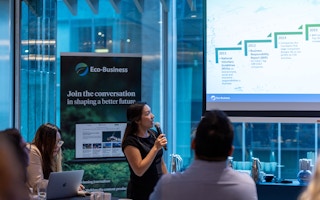Businesses, especially small and medium enterprises (SMEs) with limited resources, will soon get more support from the Singapore government, to train and equip their workers with sustainability-related skills, as part of a broader initiative to prepare the city-state’s workforce to take on good jobs in the burgeoning green economy.
The country’s trade and industry ministry and Enterprise Singapore (EnterpriseSG), the key government agency that works with Singapore-based enterprises to build new capabilities and internationalise, said on Thursday it will be enhancing the Enterprise Sustainability Programme (ESP), launched in 2021, with new initiatives, to give companies easier access to tools and resources to help them on their sustainability journey.
There will also be new foundational course offerings to provide senior and mid-level professionals across various sectors, including those in roles that traditionally do not intersect with sustainability, with the latest know-how and information on the latest environment, social and governance (ESG) trends. Courses will commence as early as April this year, and companies can receive a 70 per cent fee subsidy, subject to eligibility criteria.
Eco-Business has been appointed as one of the course providers, coming on board the programme as a new partner for the ESP.
The enhanced efforts to plug Singapore’s green skills gap are in response to rising demand from firms, said Enterprise SG in a press release. Geoffrey Yeo, assistant chief executive officer of sustainability and enterprise finance at the statutory board, said that more companies have been requesting for support in specific areas such as carbon accounting, sustainability reporting and sustainable finance.
The foundational courses help to provide a structured framework for workers who want to understand how sustainability can support business needs, said Yeo. About 400 participants have benefitted from the courses since January last year. “With the additional foundational courses, we hope to help more companies plug the knowledge gap and kickstart their sustainability journey,” he said, while emphasising that thematic courses on sustainable finance and decarbonisation will further equip trainees with deeper knowledge.
Other than their existing foundational courses, EnterpriseSG has two new comprehensive courses focusing on decarbonisation and sustainable finance.
In an earlier press statement, the government also highlighted how multinationals and larger companies are looking to decarbonise their supply chains, which creates additional pressure on local SMEs to build up their sustainability capabilities, or risk becoming uncompetitive and irrelevant.
The ESG skills gap
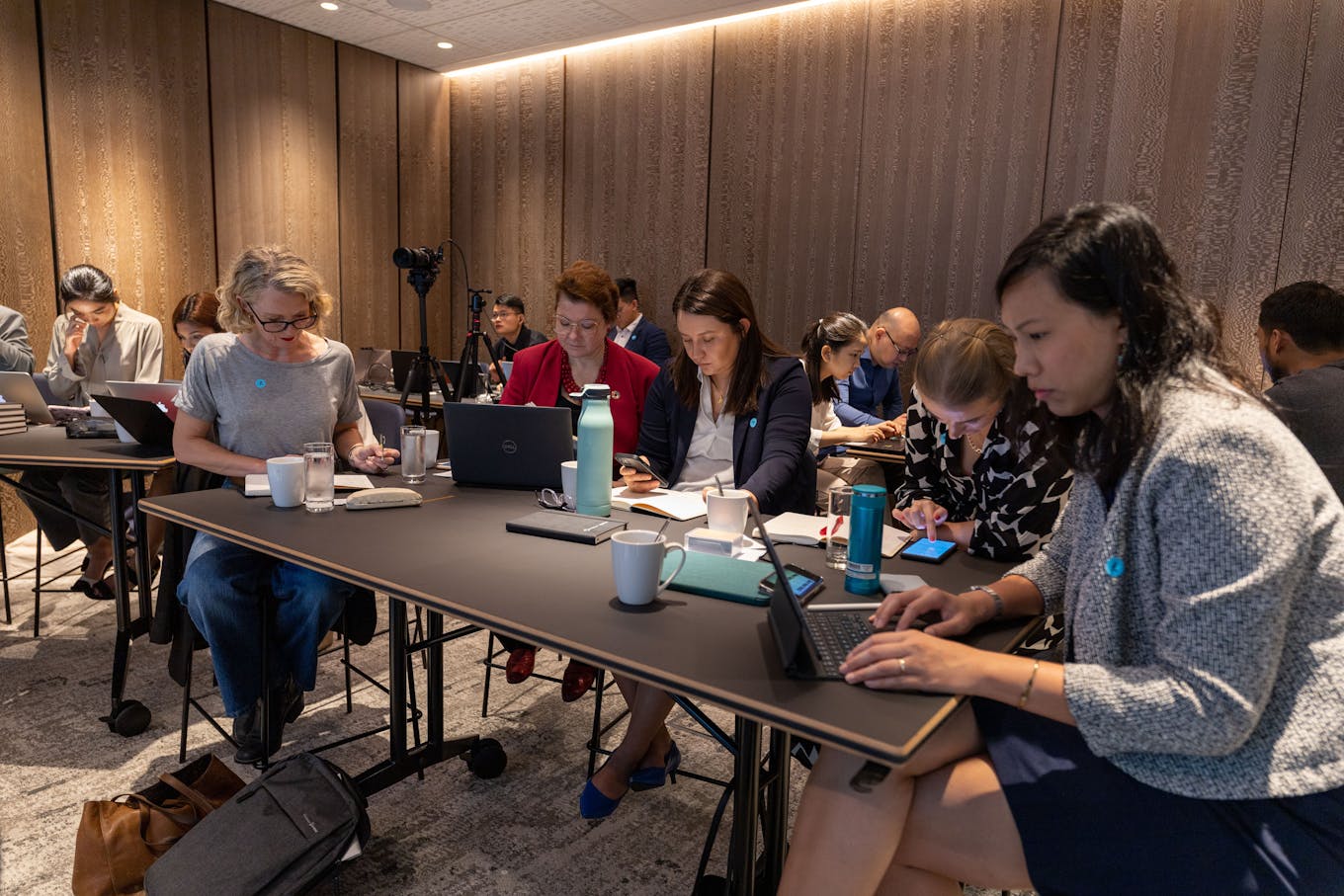
Participants at an Eco-Business ESG training session. Image: Firdaus Firlany/Eco-Business.
Globally, there has been a notable shift from oil and gas jobs to environmental and environment roles. The World Economic Forum (WEF) notes that as the need for greener roles grows, employers are increasingly focusing on ESG skills, rather than university degrees.
The demand for the green jobs – defined as jobs that require sustainability skills – grew by 30 per cent in Asia Pacific between 2016 and 2021.
“The global economy is witnessing an increase in ESG regulations and disclosure requirements driven by rising stakeholder expectations and global sustainability trends,” said Jessica Cheam, founder and managing director of Eco-Business, which runs an ESG intelligence arm that provides advisory and training services for businesses in Asia-Pacific.
“There is an urgent need for our local enterprises to build capacity on ESG and sustainability issues and to integrate this into their business strategies. ESG is about understanding and managing growing risks, but it also empowers businesses to take advantage of the emerging opportunities in this new business landscape,” said Cheam.
Eco-Business will be running its two-day course ESG and Sustainability in Asia: A Business Strategy from April 2023. It will cover fundamental ESG concepts – from net-zero target-setting to circular economy initiatives – as well as deep-dive into issues such as sustainability reporting and materiality and how to avoid sustainability risks and greenwash.
Junice Yeo, executive director and head of ESG intelligence at Eco-Business, said that there is now unprecedented momentum among governments and businesses to integrate ESG thinking into their operations. “It is not only timely but crucial for organisations to understand the relevance of this development, and how it will impact their businesses over the long term,” she said.
A LinkedIn global green skills report published in 2021 found that by 2026, demand for workers with green skills will surpass supply by 2 per cent, and the gap is predicted to continue to grow if the workforce does not level up its green skills.
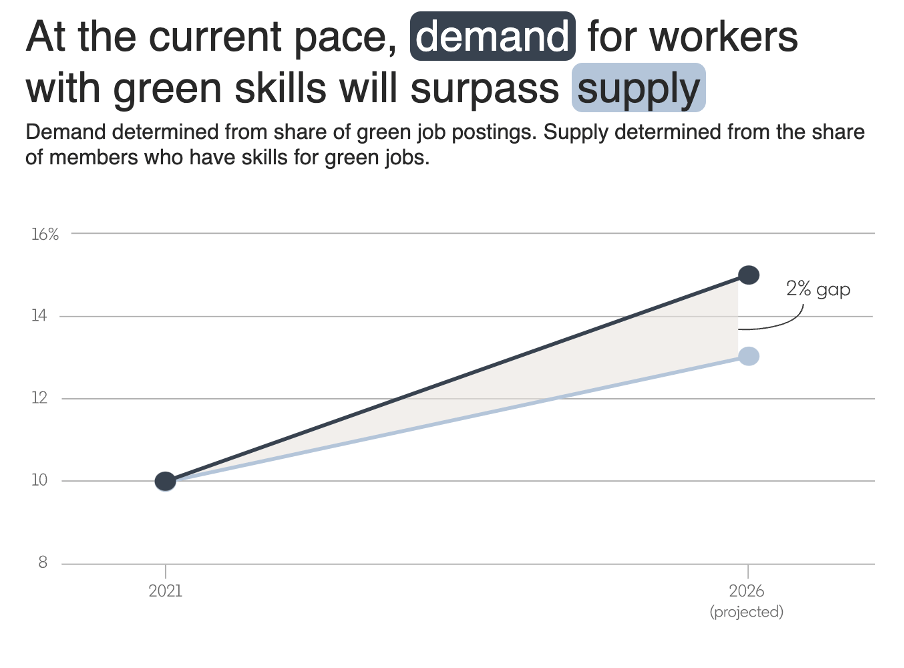
Projected gap between demand and supply for green skills jobs. Image: LinkedIn.
The report also found that almost all current green jobs are filled by those coming from green jobs. “Green-skilling,” the report said, “is needed to fuel greener jobs. However, “based on the current trajectory of green skills growth in the labour market, we are not going to have sufficient human capital to meet our climate targets.”
Companies in the report World Economic Forum’s Future of Jobs Report said that around 40 per cent of workers will require reskilling for up to six months to perform sustainability-focused jobs well.
Jobs in highly specialised roles in traditional green careers such as environmental scientists, sustainability managers or wildlife biologists are set to grow in demand, says WEF.
At the same time, there is also a growing trend of green skills needed in roles and industries not traditionally considered green, such as in fashion, pollution prevention, transport, healthcare and finance.
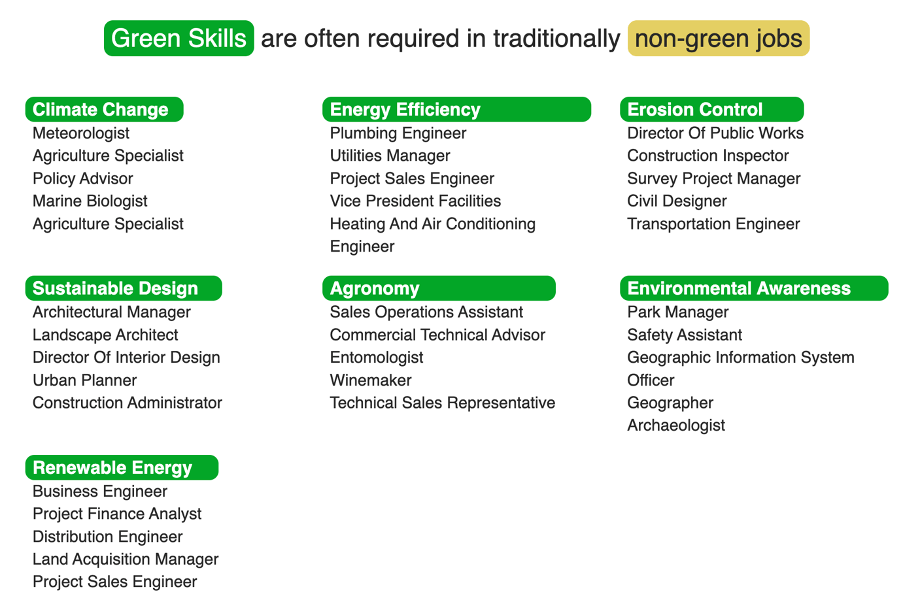
Traditionally non-green jobs will require more green skills. Image: LinkedIn.
Singapore’s green economy initiatives
In Singapore, the Singapore Green Plan 2030 details sustainability initiatives to confront climate change with concrete key targets by 2030. One of the pillars of the plan is the creation of a green economy.
Green economy targets will seek new investments to be best-in-class in energy and carbon efficiency, sustainable tourism, green finance and services, and developing Singapore to be a carbon services and sustainability hub. For the transition towards a green economy, green skills are essential.
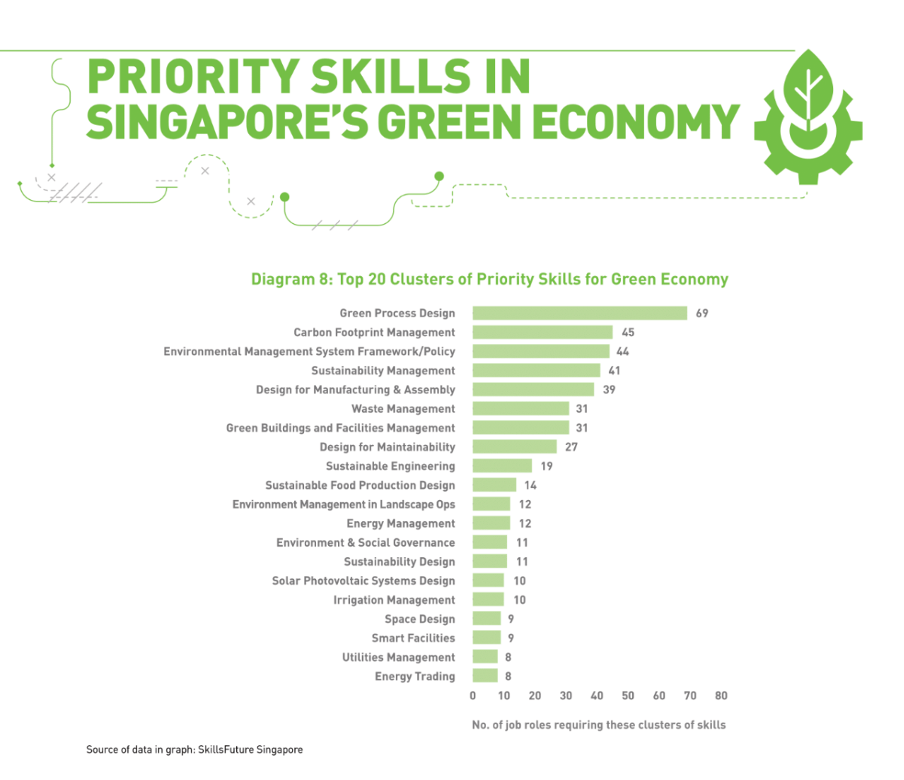
Priority skills in Singapore’s Green Economy. Image: SkillsFuture Singapore.
Other targets of the Green Plan include an increase in the amount of green space, reduced waste output and water consumption, greener commuting, cleaner energy, reduced energy consumption in buildings and infrastructure, and an increase in the proportion of locally produced food.
At this year’s Committee of Supply debates, the government further announced that it will set up a Green Skills Committee to bring together leaders and training providers to “ensure better pacing of the training of workers with job opportunities” and that “workers are equipped with the right skills to take on new roles”.
For a start, the committee will identify the jobs and skills required in the energy sector and for sustainability reporting and assurance, and build training frameworks and programmes for these jobs.
Other than the new foundational courses and targeted thematic courses, EnterpriseSG will also be setting up a one-stop website for SMEs to access sustainability-related information and resources. Thematic and sectoral sustainability “playbooks” will be launched online to explain key concepts and outline practical steps SMEs can take to become more sustainable.
Existing companies that have been appointed as ESP Foundational series training partners include PWC, Global Compact Network Singapore and Singapore Environment Council. Other than Eco-Business, new course providers include Accenture and Deloitte.
Until 2026, enhanced Enterprise Development Grant will provide subsidies of up to 70 per cent for businesses and workers who build up their sustainability capabilities through such EnterpriseSG-partnered training frameworks for sustainability-related jobs and skills, and the identification of new demand areas for green skills to be provided by course providers, including Eco-Business.
More information about Eco-Business’ ESG and Sustainability in Asia: A Business Strategy course can be found here, and you can sign up for the course here.

